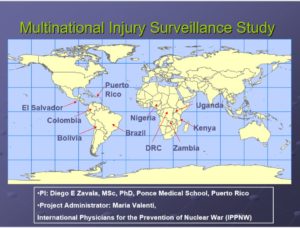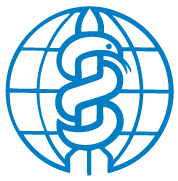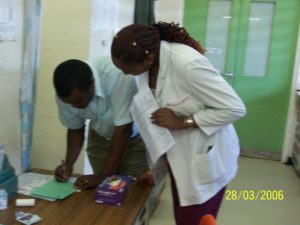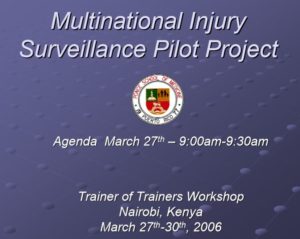IPPNW’s Multinational Injury Surveillance System Pilot Project (MISSPP), Africa – Kenya, Zambia, DR Congo, Nigeria, Uganda
Our first multi-country research undertaking involved teams of IPPNW physicians and medical students who collected data for six months on victims of gunshots and other violence at hospital emergency rooms in 5 African countries. The Multinational Injury Surveillance System Pilot Project (MISSPP) was ambitious and the first project of its kind in IPPNW. It was two years in development, planning, and training prior to launch, and was overseen by epidemiologist Dr. Diego Zavala of the Ponce Medical School, Puerto Rico.
The pilot study was implemented in countries where IPPNW has active affiliates and physician leaders associated professionally with local hospitals in major cities. Training for researchers from all five sites was conducted in Nairobi, Kenya, prior to introduction of the site research, with field testing at pilot site Kenyatta National Hospital. The other major cities where research took place were Kisangani, DRC, Kano, Nigeria (with related research in Port Harcourt and Jos), Mbale, Uganda, and Lusaka, Zambia.
The purpose of MISSPP was to systematically collect, review and evaluate the context in which specific external injuries occur in a great diversity of socio-cultural populations in Africa. A second objective was to provide evidence-based recommendations to local government health authorities to address the incidence of injury in their communities from a public health perspective, as well as other public policy makers and community advocates in order to encourage the development of armed violence prevention strategies.
Early development and training for researchers was funded in part by Foreign Affairs Canada. The primary study funder was the Geneva-based research organization Small Arms Survey. Other financial contributors included IPPNW Norway and private contributions.
-
March 27 – 30, 2006: Presentation used to train the researchers
In order to raise awareness of the scope of the violent injury crisis, and help inform policy-making to implement intervention strategies, results from the research projects have been shared widely – with media, NGOs and community leaders, IPPNW affiliates worldwide, published in international journals, and presented at major international health conferences.
 By Diego E Zavala, M.Sc., Ph.D.
By Diego E Zavala, M.Sc., Ph.D.
By Diego Zavala, MSc PhD (excerpted and updated by Maria Valenti, IPPNW)
- Special Section on the prevention of injuries caused by violence in Vol.24, No. 4 (2008), Medicine, Conflict and Survival. Zavala DE, Bokongo S, John IA, Senoga IM, Mtonga RE, Mohammed AZ, Odhiambo W, Olupot-Olupot P. Implementing a hospital based injury surveillance system in Africa: lessons learned. Medicine, Conflict and Survival 2008; 24(4):260-272.
- John IA, Mohammed AZ, Lawoko S, Nkanta CA, Frank-Briggs A, Nwadiaro HC, Tuko M, Zavala DE, Kolo ES, Ramalan MA, Bassey DE, Didi E. Implementing a hopital based injury surveillance system: a case study in Nigeria. Medicine, Conflict and Survival 2008; 24(4):273-279.
- Mtonga RE, Zavala DE. Implementing a hopital based injury surveillance system in Zambia: a preliminary report. Medicine, Conflict and Survival 2008; 24(4):280-284.



